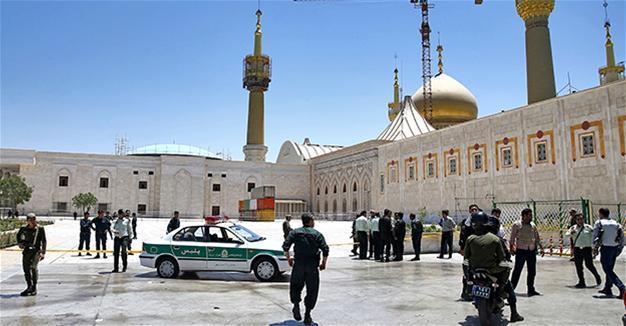Iran's Revolutionary Guards claim Saudi Arabia behind deadly terror attacks in Tehran
TEHRAN

AP photo
Iran's Revolutionary Guards say Saudi Arabia was behind twin attacks in Tehran on June 7 that killed at least 12 people and injured 43, a statement published by the Guards said."This terrorist attack happened only a week after the meeting between the U.S. president (Donald Trump) and the (Saudi) backward leaders who support terrorists. The fact that Islamic State has claimed responsibility proves that they were involved in the brutal attack," said the statement, published by Iranian media.
The attacks were the first claimed by the hardline Sunni Muslim militant group in the tightly controlled Shi'ite Muslim Iran.
Suicide bombers and gunmen attacked Iran’s parliament and the Mausoleum of Ayatollah Khomeini in Tehran on the morning of June 7, killing at least 12 people in a twin assault claimed by the Islamic State of Iraq and the Levant (ISIL).
The jihadist group released a video purporting to show gunmen inside the parliament building and one man, who appeared wounded, on the floor.
The rare attacks were the first claimed by the hardline ISIL inside the Shiite Muslim country.
Iran is one of the powers leading the fight against ISIL in Syria and neighboring Iraq.
The attacks began midmorning when assailants armed with Kalashnikov rifles stormed the parliament building. One of the attackers later blew himself up inside, where a session had been in progress, according to a statement carried by Iran’s state TV.
Attackers dressed as women burst through parliament’s main entrance in central Tehran, deputy interior minister Mohammad Hossein Zolfaghari said, according to the semi-official Tasnim news agency.
“One of them was shot dead and another one detonated his suicide vest,” he said.
About five hours after the first reports, Iranian news agencies said four people who had attacked parliament were dead and the incident was over.
At least 12 people were killed by the attackers, the head of Iran’s emergency department, Pir-Hossein Kolivand, was quoted as saying by state broadcaster IRIB.
“I was inside the parliament when shooting happened. Everyone was shocked and scared. I saw two men shooting randomly,” said one journalist at the scene, who asked not to be named.
Soon after the assault on parliament, another bomber detonated a suicide vest near the shrine of the Republic’s revered founder, Ayatollah Khomeini, a few kilometers south of the city, Zolfaghari said, according to Tasnim.
A second attacker was shot dead, he said.
The Intelligence Ministry said security forces had arrested another “terrorist team” planning a third attack, without giving further details.
The attacks took place less than a month after the re-election of President Hassan Rouhani, a moderate, whose landslide victory defeated candidates supported by the hardline clergy and the Islamic Revolutionary Guard Corps (IRGC), which is responsible for national security.
Several countries, including Turkey, condemned the attacks.
“We condemn these heinous attacks, wish Allah’s mercy upon those who lost their lives and convey our condolences to the people of Iran, particularly to the relatives of those who lost their lives, as well as the government of Iran, and wish a speedy recovery to the injured,” the Foreign Ministry said in a statement on June 7.
“We are saddened to learn that the Iran Islamic Consultative Assembly and Imam Khomeini Mausoleum in Tehran have come under terrorist attacks this morning and there are people who lost their lives or injured as a result of these attacks,” it added.
“We strongly condemn the attacks that targeted the Iranian parliament and the Imam Khomenei mausoleum in Tehran,” the French Foreign Ministry said in a statement.
The Kremlin said the attack on two targets underlined the need for countries to pool their efforts to fight against terrorism, something it said meant working closely with Muslim nations.
The Syrian Foreign Ministry said the attacks were backed by various governments, without specifying.
















